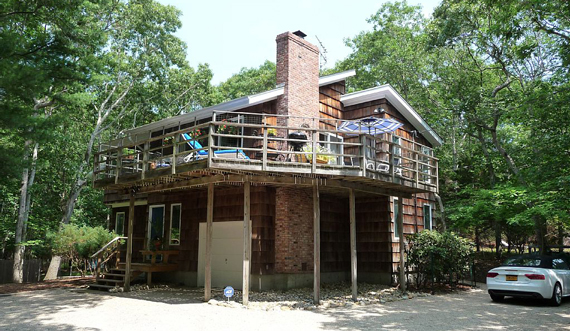For those guests who prefer houses to hotels, the Hamptons has always offered numerous rental options, from quaint shingled cottages to sprawling bowling-alley-lined McMansions.
But some of those visitors are to blame for harming the resort area’s quality of life, local officials say, bringing excessive noise, a glut of cars and a revolving door of strangers to the region. In response, communities on the North and South Forks are aggressively cracking down on what could be called the Airbnb crowd — those short-term renters who are accused, fairly or not, of summer shenanigans.
And that policing — which has come in the form of registries, bans on short-term stays and stepped-up tax collections — is roiling the seasonal rental market, according to the short-term landlords, lawyers and real estate brokers.
“There’s a creeping tyranny that’s evolving here in the Hamptons that’s really marginalizing peoples’ property rights,” said Andrew Saunders, the president of the brokerage Saunders & Associates [TRData], who predicted in mid-June that his deal total for summer rentals would be off about 25 percent in 2016.
And while in the Hamptons there has not been any sweeping investigation of short-term online listings, one was conducted in 2014 in New York City, where renting out apartments for 30 days or less is prohibited by the city building code. That investigation by New York State found that three-quarters of Airbnb’s listings in the city were illegal.
Then in June 2016, the New York State Senate and Assembly passed what’s been called an “anti-Airbnb bill,” which would sharply punish New York City tenants that post online ads offering their apartments for short stays. They would be fined up to $1,000 for the first offense, $5,000 for the second offense and a hefty $7,500 for the third offense. At press time, Gov. Andrew Cuomo was expected to sign the legislation into law.

Airbnb CEO Brian Chesky
Although this law does not directly impact the Hamptons, there is a controversial new enforcement tool being deployed on the East End: A new mandatory rental registry in East Hampton, the sprawling town that includes the villages of Montauk, Amagansett and Springs.
To register, seasonal landlords must fill out a two-page form for all rental stays, have the form notarized and pay a $100 fee. In addition, and perhaps most detrimentally, they must verify their properties’ certificate of occupancy to make sure it isn’t in violation of any building codes.
Only then do they receive a registry number, which is supposed to appear in all advertisements for their homes.
Among other problems, homeowners are struggling to make sure their properties adhere to local codes. Some are discovering that their aged decks actually were never permitted, or that their garages creep over lot lines, which could be expensive to correct, said Brian Matthews, a lawyer with Eagan & Matthews in East Hampton.
“These are things that are suddenly prohibiting people from renting out properties,” said Matthews, who is anticipating an uptick in calls from would-be renters this summer as a result of the tightened rules.
East Hampton’s registry law, which targeted “rising concerns and incidences of single-family residences being overcrowded, utilized as share houses, motels or other transient housing accommodations,” among other presumed misdeeds, passed in mid-December with a unanimous 5-to-0 vote of the town’s board.
Code enforcement has safety upsides, supporters of the law point out. It requires homeowners to have four-foot fences around their swimming pools, with alarms on each fence gate, which can prevent children from drowning. It also mandates working smoke alarms on every floor.
But the community is clearly divided. In fall 2015, red, white and blue signs urging residents to “Stop the Rental Registry” lined East Hampton roads. A related website warned that the registry would “hurt local property owners, local businesses and our local economy on the East End of Long Island.”
Indeed, the penalties for breaking the law by not registering your rental can seem steep. First offenders face fines of up to $1,500 and as much as 15 days in prison, with even harsher punishments for other related housing code violations.
The law, which took effect on May 1, does not apply to the town of East Hamptons’ incorporated villages, Sag Harbor and East Hampton, which are self-ruling. But in early June, based on the lack of registry numbers that appeared in ads on Airbnb, many houses seemed to be violating the law.
Not every landlord has to have a registry number. If a homeowner sleeps under the same roof as his tenants, he would not be required to register.

Visitors can rent this three-bedroom in the Clearwater Beach part of East Hampton on HomeAway for $686 a night.
But Michael Sendlenski, the town’s attorney, said that many local homeowners are breaking the law, and that the first wave of cases he was bringing against them would head to court this summer.
Other aspects of the East Hampton registry law are also onerous, according to some seasonal landlords, such as the fact that no more than four unrelated adults can stay in one house, said Lynne Scanlon, a writer who for years has rented out her three-bedroom shingle-sided home in the Clearwater Beach section of East Hampton.
Though Scanlon has registered with the town — her five-digit registry number prominently appears in the headline of her HomeAway ad — she said she recently had to turn down a group of six women friends at a loss of $4,800.
She is still occasionally renting out her house, which was built in 1982, and is currently listed on HomeAway for $686 a night. But the renters tend to be couples taking rooms for weekends, hardly the more lucrative long-term stays by large groups that she was envisioning, Scanlon said.
As a result, she has hired fewer housekeepers and landscapers than she usually does. “There’s a real ripple effect to this,” she said. “I think people are only just beginning to understand.”
Elsewhere on the South Fork, in the town of Southampton — where the enclaves include Westhampton, Water Mill and Sagaponack — there are similar restrictions in place. The system there, created in 2008, forces landlords to obtain rental permits through a process that might appear to be even more burdensome than East Hampton’s.
Requiring a $200 fee and eight pages of documentation, including tenant names and detailed floor plans, Southampton’s permit also requires an in-person visit from a code-enforcement officer, according to Dave Betts, the former director of public safety for Southampton, who currently holds the same job in East Hampton.
In the town of Riverhead, which includes Jamesport and Aquebogue, the rules are even stricter. Rentals for less than 30 days are not allowed at all. Owners who want to rent for longer must file a detailed rental agreement with the town, pay a fee of at least $300 and submit to a building inspection.
Meanwhile, in the town of Southold, which spreads across most of the North Fork, officials have also taken an aggressive tack. In August 2015, the town board voted to impose a minimum 14-day stay in private homes. And, most tellingly, there’s a presumption of guilt for any owner who lists a property on Airbnb, HomeAway, VRBO, or similar sites.
“Does the town really want to start offering up residential zoning in the name of commerce and tourism?” Southold supervisor Scott Russell said in news reports. “You have to make decisions about tourism versus quality of life.”
Some homeowners in Southold — which encompasses Mattituck, Peconic and Cutchogue — are crying foul. Critics of the restrictions say they couldn’t afford to live on the East End without the income from short-term summer rentals.

Nick Planamento
Local resident Conni Cross, an interior and landscape designer whose modest two-bedroom home has provided steady rental income since 2013, said that short-term residents are not a big cause of noise complaints because they haven’t settled in and aren’t likely to throw big bashes. She said guests in her Long Road Cottage, located on five acres off Main Road in Cutchogue, tend to prefer biking, kayaking or wine-tasting.
“The town has responded to very vocal, hysterical people who claim to have party houses next door to them. It does exist, but it’s a very, very small percentage,” said Cross, who is opposed to the new law, which she said will cost her $30,000 in lost revenue this season as two-week stays aren’t popular at her place.
That cottage, which is not available until mid-July, is currently listed on VRBO for $343 a night. Cross said she had been speaking with lawyers about possibly joining a class-action suit against the town.
While homeowners are adjusting their expectations to receive fewer guests this season, they may also be reaching deeper into their pockets.
Last summer, the comptroller’s office of Suffolk County launched an effort to collect a lodging tax on houses rented out for less than a month, notably those marketed through websites like Airbnb or VRBO.
Although the tax, which is currently 3 percent of the nightly room rate, had been on the books since the early 1990s, it was mostly collected from chain hotels and established bed-and-breakfasts — but rarely collected from homeowners who rented out bedrooms, according to a source in the comptroller’s office.
“The massive non-compliance with this law found by my office has caused me to commence an initiative to vigorously pursue scofflaws,” John M. Kennedy, Jr., the Suffolk County comptroller, wrote in a May 3 letter that was widely distributed to Suffolk County real estate professionals, who are expected to inform owners of the requirements.
In 2015, the tax produced $9.5 million in revenue, which pays for the promotion of tourism on Long Island. But this year, with 101 new properties registered between July 2015 and early June 2016, the revenue haul is expected to grow to $10.5 million.
Landlords who don’t comply will be fined $50 a day and will owe back taxes.
Nicholas Planamento, an associate broker with Town & Country Real Estate, and also the past president of the Hamptons and North Fork Realtors Association, said he has warned his clients about the high stakes.
“The county was awakened to this and thought, here’s an opportunity to collect revenue,” Planamento said. “The county is calling people scofflaws. It’s been hostile.”
As for the websites themselves, Airbnb did have discussions with the Suffolk County comptroller’s office about collecting the tax on behalf of their users. But there was a catch. Airbnb insisted that the site’s users should remain anonymous, and that they shouldn’t be subject to audits, terms which the county found unacceptable.
For its part, Airbnb said it encourages its users to respect local laws, even if it does not spell them out on its site. “We are eager to continue having meaningful conversations with communities in Long Island about ways to make it easier, not harder, for local residents to share their homes and make ends meet,” Peter Schottenfels, an Airbnb spokesman, wrote in an email to The Real Deal.
Schottenfels pointed out that on May 31, 2016 Airbnb’s site unveiled a page through which neighbors can complain about late-night partiers.
HomeAway, on the other hand, is taking a harder stand, claiming that it is being pinched by the new — and the newly enforced — regulations.
“The extreme restrictions implemented by Southampton and East Hampton are incredibly burdensome for homeowners and visitors,” Ashley Hodgini, a spokeswoman, wrote in an email to TRD. “In our experience, it will be difficult for either town to achieve compliance with these policies. Instead, the short-term rental activity will be driven underground, where it cannot be monitored, regulated or taxed.”
Reading the online listings, it can be difficult to discern which are in compliance. Indeed, it can appear as if the underground house-rental economy is still thriving, despite the new regulations. A recent Airbnb search to stay a night in a house in Montauk, which is in the town of East Hampton, had 57 results, though a few suggested the owner would be on-site, which would negate the rule about short-term stays.
But the Hamptons appears to have citizen watchdogs on the case, according to Betts, the public safety director of East Hampton. He said that an online complaint system for all types of community issues that was set up in 2014 has tipped off authorities about problematic summer house rentals.
In the first year of operation, the online system received 215 complaints, although the number of those that were housing-related was unavailable in data collected by TRD in a Freedom of Information Act request. Then in 2015, there were 317 complaints, 42 of them housing-related. In 2016, through June 8, there were 130 complaints, 10 of them related to housing, although the height of the summer rental season had yet to kick in. “It’s been helpful,” Betts said.
